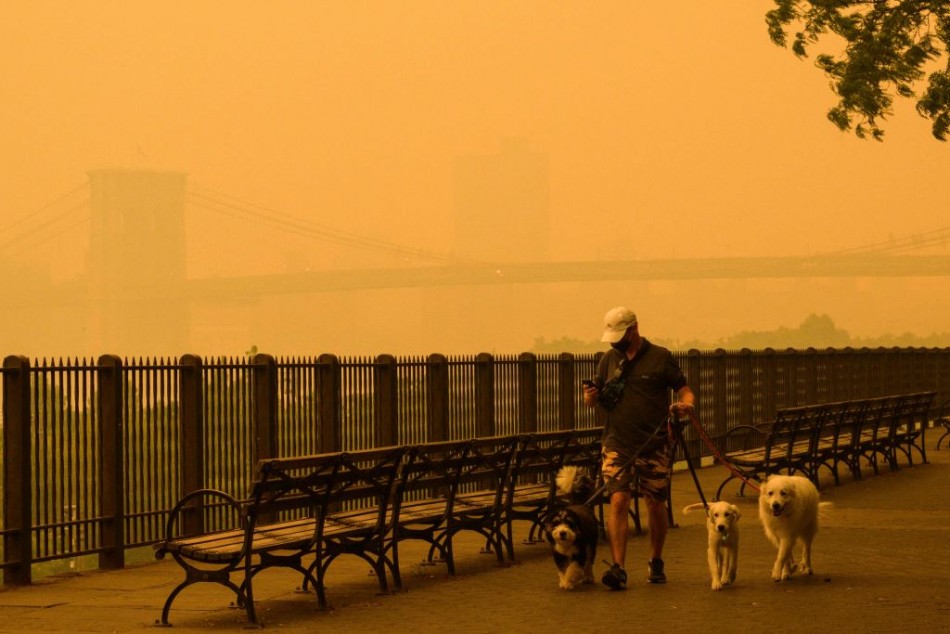Emergency Planning Criticized as New Yorkers React to Late Notifications on Unhealthy Air Quality

New York City faces criticism over its emergency planning strategies as residents express their dissatisfaction with late notifications regarding the hazardous air quality caused by the influx of smoke from Quebec's wildfires.
The delayed alerts have left many questioning the city's preparedness to handle such situations and have raised concerns about public health and safety.
As a mammoth-sized cloud of smoke spews from Quebec's wildfires, engulfing the Northeast and mid-Atlantic regions, millions of residents find themselves at risk of breathing unhealthy air.
Children are being forced to stay indoors, flights are being grounded, and major cities like New York City and Philadelphia are experiencing air quality indexes deemed "very unhealthy" and "hazardous" by government sources.
Despite these alarming conditions, many New Yorkers argue that the city failed to provide timely and sufficient notifications.
Questions Arise about Emergency Planning
According to ABC, the late notifications have prompted criticism of New York City's emergency planning protocols. Some environmentalists and concerned citizens argue that the city should have been better prepared to handle such events.
Rebecca Bratspies, director of CUNY Law School's Center for Urban Environmental Justice Reform, expressed her disappointment, stating,
"There is supposed to be emergency planning for situations like this." She adds that the city had access to weather forecasts indicating the smoke's movement and should have had a comprehensive plan in place.
Mayor Eric Adams, however, defended his administration's approach, claiming that the rapidly changing nature of the situation made it challenging to provide immediate notifications.
He emphasized the lack of a blueprint or playbook for addressing these unique challenges.
Despite the mayor's explanation, some critics argue that air masses move slowly, allowing for predictions of their impact well in advance.
Holly Porter-Morgan, a professor of environmental science, expressed disappointment, stating that the city could have done a better job informing the public as soon as the air quality index reached dangerous levels.
Public Health Concerns Mount
According to CNN, by Wednesday evening, prominent urban areas like Philadelphia, Jersey City, and New Haven faced air quality indexes ranging from 200 to 300, classified as very unhealthy, while New York City reached a hazardous AQI of 484 at 5 p.m. on Wednesday.
Montgomery County Public Schools in Maryland took precautions by canceling outdoor activities due to the smoke influx.
The smoke also disrupted professional sports games and forced the closure of several horse racing tracks on the East Coast.
Philadelphia issued a code red alert, urging specific residents to stay indoors to avoid the serious health effects that could be triggered by the smoke, particularly for vulnerable groups such as the elderly, young children, and individuals with heart or lung conditions.
Read Also: Virginia Community in Shock as High School Graduation Ceremony Descends Into Gunfire, Chaos
Corporate Response to Unhealthy Air Quality
The impact of unhealthy air quality has also extended to the corporate sector.
According to CNBC, Google, recognizing the severity of the situation, instructed its East Coast employees to work from home to limit their exposure to the outdoor air.
The company cited the New York State Department of Environmental Conservation's assessment of "unhealthy" air quality levels in many parts of the region.
Google's decision to prioritize employee safety in the face of deteriorating air conditions highlights the seriousness of the situation.
The delayed notifications and subsequent public outcry over New York City's emergency planning have shed light on the importance of preparedness and timely communication during environmental emergencies.
The need for proactive measures to protect public health and safety has become evident, prompting comprehensive response protocols.
As cities face increasingly unpredictable challenges, learning from these experiences will be crucial to ensuring the well-being of their residents in the future.
Related Article: New York City Tops List of Worst Air Quality Due To Canadian Wildfire Smoke
© 2024 ParentHerald.com All rights reserved. Do not reproduce without permission.
